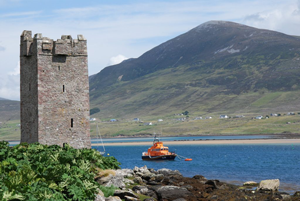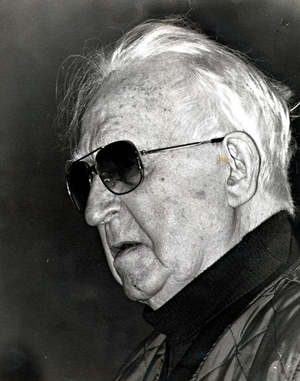ON THIS DAY
Published in Issue 3 (May/June 2023), News, Volume 31MAY
13/1986
Peadar O’Donnell (93), militant socialist, died. Born in the Irish-speaking Rosses of north-west Donegal, the youngest of nine children of a musician and migrant worker, O’Donnell was amongst the most influential left-wing republicans during the early years of the twentieth century. His entire life was devoted to the cause of a 32-county socialist republic. Abandoning his position as a teacher on Arranmore Island, he joined the IRA during the latter stages of the War of Independence to lead a flying column in his native county. Thereafter he opposed the Anglo-Irish Treaty (he was amongst the anti-Treaty garrison that occupied the Four Courts), was imprisoned and took part in the mass hunger strike by anti-Treaty prisoners in late 1923, which lasted for 41 days. Afterwards, as editor of An Phoblacht (1926–9), he tried unsuccessfully to wean republicans from militarism to socialist agitation and during the inter-war years was a key figure in the short-lived Republican Congress (1934–5), which sought to establish a workers’ republic on the lines advocated by James Connolly. His solitary success was in organising small farmers against payment of land annuities to the British government in the late 1920s and early 1930s, a policy that was adopted by Fianna Fáil and contributed to that party’s electoral success in 1932. Better remembered today, perhaps, as a prolific writer, journalist and editor over a 40-year period until the 1960s, he was editor for a time of The Bell (1940), founded by Seán Ó Faoláin. Two of his six novels, Islanders (1928) and The big windows (1955), are regarded today as classic depictions of rural life.
01/1943
Sir Basil Brooke became prime minister of Northern Ireland in succession to John Miller Andrews.
03/1933
The Constitution (Removal of Oath) Act removed the oath of allegiance from the constitution of the Irish Free State.
06/2008
On his last day in office, Taoiseach Bertie Ahern opened a new visitors’ centre on the site of the Battle of the Boyne in County Meath along with First Minister of Northern Ireland Revd Ian Paisley.
07/2008
Brian Cowan (48), minister for finance and tánaiste, was elected taoiseach by Dáil Éireann.
11/1823
John Thomas Troy, archbishop of Dublin since 1784 and effectively the leader of the Catholic Church in Ireland, died.
22/1923
Stanley Baldwin (Conservative) succeeded Andrew Bonar Law as British prime minister.
22/1998
Referendum on the Good Friday/Belfast Agreement. In Northern Ireland over 70% voted in favour, whilst in the Republic of Ireland the referendum on the Agreement and on changes to Articles 2 and 3 of the constitution resulted in over 94% voting in favour.
24/1923
The Civil War ended when the new chief-of-staff, Frank Aiken, ordered the IRA to dump arms.
27/1923
Henry Kissinger, politician, diplomat and influential geopolitical consultant, born in Furth, Bavaria, Germany.
27/1993
President Mary Robinson made a private visit to Queen Elizabeth II at Buckingham Palace, the first meeting of an Irish head of state with a British monarch.
28/2003
James Plunkett (83), writer, best remembered for Strumpet city (1969), set in the years leading up to and including the Lockout (1913), died.
JUNE

Above: Granuaile’s Tower, Kildownet, Co. Mayo. The victims of the 1894 Clew Bay disaster were buried in a communal grave nearby.
14/1894
The Clew Bay, Co. Mayo, disaster. From early morning over 400 young people, mainly teenage girls, gathered in high spirits at Cloughmore, on the southern tip of Achill Island, and embarked on four hookers bound for Westport to join the SS Elm. A steamship of the Laird Line, she was to bring them to Ayreshire for seasonal work as ‘tattie hokers’—the back-breaking work of gathering potatoes. Disaster struck when one of the hookers, Victory, which was grossly overcrowded with 126 on board, approached Westport Quay. As her passengers sighted the Elm, most of them ran to the starboard side waving handkerchiefs at her crew. Dangerously top heavy, the Victory was capsized by a sudden gust of wind, trapping many under the heavy, saturated sails. Twenty-four of the victims were teenage girls and young women, such as the three sisters Mary (24), Margaret (19) and Anne (15) Malley from the Valley, Achill. Remarkably, the majority of those rescued boarded the Elm and continued on their journey in soaking clothing. Two days later, most of the bodies were brought back by the Midland’s Great Western Railway’s first train from Westport to the island, described by the Mayo News as ‘like a mighty steam hearse moving quietly along through mountains and glens’, and were buried in a communal grave at Kildownet, beside Granuaile’s Tower. By tragic coincidence, the last train on that route, in September 1937, carried the bodies of ten young tattie-hokers who perished in a fire in a bothy in Kirkintilloch, Dunbartonshire, a route at present marking the Great Western Greenway.
03/1923
Disagreement between James Larkin and William O’Brien of the ITGWU led to a split in the labour movement. Larkin and his brother Peter subsequently formed the Workers’ Union of Ireland (WUI).
03/1963
Teilifís Éireann closed down immediately after its 9pm news bulletin as a mark of respect following the death of Pope John XXIII.
12/1973
Six elderly people, four women and two men, including three from the same family, were killed when an IRA car bomb exploded in Coleraine, Co. Derry.
15/1988
Six British soldiers were killed by an IRA bomb under their unmarked van in Lisburn, Co. Antrim. They had just taken part in a fun run for charity.
17/2013
The 39th G8 summit of the world’s richest industrialised countries opened in the Lough Erne Resort, Co. Fermanagh. It was President Vladimir Putin’s last summit. Russia had joined the forum in 1997.
22/1923
The Education Act (NI) restructured primary and secondary education, providing for religious education as a voluntary appendage to a secular system.
24/1993
Dáil Éireann passed the Criminal Law (Sexual Offences) Act, which decriminalised consensual homosexual acts.
25/1973
Paddy Wilson (40), a senior SDLP politician, and Irene Andrews (25), a Protestant civil servant, were shot and stabbed to death in a frenzied attack by loyalist paramilitaries on a remote road in East Belfast.
25/1973
Erskine Hamilton Childers (Fianna Fáil) was sworn in as fourth president of Ireland after defeating T.F. O’Higgins (Fine Gael) by less than 100,000 votes.
26/1963
President J.F. Kennedy arrived in Ireland on a four-day visit.
28/1973
Elections to the NI Assembly resulted in 26 seats for unionists opposing the government’s constitutional proposals and 24 for Brian Faulkner’s Official Unionist Party, which backed the proposals.

















